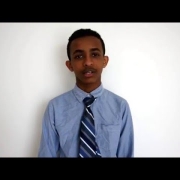Religion and Peacebuilding
By David Smock, Susan Hayward, and Qamar-ul Huda
Religion is frequently a factor in international conflict. It is rarely the principal cause of conflict, even when the opposing groups are differentiated by religious identities, such as Catholics and Protestants in Northern Ireland. But it is a contributing factor to conflict in places as diverse as the Middle East, the Balkans, Sudan, and Indonesia.
At the same time, religion can be invaluable in promoting understanding and reconciliation, and it can provide a basis for peacebuilding efforts. The potential for leveraging religion as a positive force in conflict prevention, management, and resolution has never been greater than in today’s world, where religion plays an increasingly powerful role in shaping local and international politics, as well as public opinion.

Pastor James Wuye (left) and Imam Muhammad Ashafa (right) of the Interfaith Mediation Center in Kaduna, Nigeria, discuss interfaith peacebuilding at USIP in October 2011. Both seek to build peace between Christians and Muslims in Nigeria after they had been members of competing militias.
Religion is often considered a taboo subject by polite visitors to conflict zones. It’s too sensitive and it conjures too many strong feelings. It’s too easy to say the wrong thing and offend someone. Many may argue that it’s best to leave religion alone and stick with safer topics.
But there are many case studies that demonstrate that sensitive subjects such as religion are important to tackle in seeking to prevent, manage, or resolve conflict. Tools such as facilitated dialogue can be useful in transforming contentious issues into powerful means of peacebuilding.
For example, the Alexandria Process in Israel/Palestine, which USIP helped to fund and support, brought together Jewish, Christian, and Muslim religious leaders to discuss and find common ground on central issues afflicting the region.
In a very different part of the world, Colombia, the Ecumenical Women Peacebuilding network brings together Protestant and Catholic women involved in peacebuilding through their church communities. This was also initiated with USIP support and we have continued to offer direct facilitation of dialogue and relationship-building between participants, as well as offering training to the women participants so that they might facilitate similar dialogues in their own communities, even as they continue to work together for peace and justice.
In Sri Lanka, USIP has been supporting a network of over 100 Buddhist, Christian, Muslim, and Hindu religious leaders who receive training in conflict analysis, peacebuilding, and reconciliation while participating in inter and intra-faith dialogues as a way to continue to deepen the relationships between members and strengthen the network.
The Religion and Peacemaking program at USIP has employed facilitated inter and intra-faith dialogue as an essential aspect of its work in conflict zones, particularly in conflicts in which religion is serving as a driver of conflict, since 2000.
Such dialogues can be a useful and important means to prevent conflict by strengthening relationships between communities in order to decrease the potential for communal divides to become fault lines of violence. When conflict breaks out between the communities, such dialogues can help build bridges to resolve the conflict before it breaks into violence.
There are many other ways in which religious organizations and actors effectively contribute to peacebuilding, including by conducting training on conflict resolution, directly mediating between parties in conflict, engaging in conflict prevention, promoting human rights and democratic governance, and organizing post-conflict reconciliation.
Consider, as examples, the role of Archbishop Desmond Tutu in leading reconciliation efforts in post-Apartheid South Africa, Buddhist monks protesting the military junta in Burma, the role of the Catholic lay organization Sant’Egidio in mediating Mozambique’s civil war, or Ayatollah Sistani’s efforts to reduce religious violence and ensure democratic self-rule in Iraq.
The Religion and Peacemaking Program at USIP has supported the development of textbooks for peace and conflict resolution studies in madrasas in Pakistan, Afghanistan, and Indonesia. Madrasa teachers have been trained in peace studies to teach students to understand Islamic concepts of peacemaking, mediation, and nonviolence. Many madrasa institutions now serve as Peace Resource centers for the local community, and serve as a space for Sunni and Shi'ite religious leaders to convene workshops on peacebuilding and for further collaboration
More information about USIP’s on Religion and Peacemaking
Additional USIP Resources:
- Women, Religion and Peacebuilding (September 2015)
- Dalai Lama, American Muslims Urge Activism to Bridge Faiths (February 2015)
- Central African Republic: Religious Leaders Call For Dialogue Backed By Grassroots (November 2014)
- Religious Authority and the Promotion of Sectarian Tolerance in Pakistan (October 2014)
- Religious Leaders Countering Extremist Violence: How Policy Changes Can Help (October 2014)
- Eye on USIP's Religion and Peacemaking Center (November 2011)
- Learn about our work to address religious tensions in Egypt (May 2011)
- Information about the book “Interfaith Dialogue and Peacebuilding” (USIP Press, May 2002)
- A Manual to Facilitate Conversations on Religious Peacebuilding and Reconciliation (August 2011)
- Video: The Imam and the Pastor - Follow the story of Pastor James and Imam Ashafa as they grow from competing militia members in Nigeria to now working cooperatively to build peace through the Inter-Faith Mediation Centre, supported by USIP.








